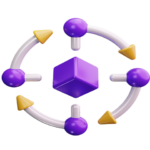Shaping the Future of Enterprise Architecture and Software Engineering
The tech world is really excited about AI agents, which are digital beings that can see what’s happening around them, make choices, and act on their own. For people who design and build software, AI agents are changing everything about how systems are created and expanded. They help improve work processes and provide useful predictions, transforming how companies run their operations.
What Are AI Agents?
AI agents are smart software programs that can observe their surroundings and work towards certain goals. They use technology that helps them understand language and make decisions on their own. Unlike regular software that needs specific instructions to operate, AI agents learn from the information they gather and adjust how they behave as they go along.
Types of AI Agents
- Reactive Agents: These are programs that respond only to what’s happening right now without thinking about the past. A good example would be recommendation systems like Netflix or Spotify, which suggest shows or songs based on your current choices.
- Goal-Oriented Agents:These programs are designed to reach specific goals. You often find them in robots or tools that automate tasks.
- Learning Agents: These are smart programs that get better over time by learning from experience. A great example is self-driving cars, which improve their driving skills through practice.
- Multi-Agent Systems: This involves groups of these agents working together or against each other to accomplish complex tasks. For instance, they can help with organizing deliveries and managing supply chains.
Impact on Enterprise Architecture
- Faster Decision-Making
AI agents help make quick decisions by analyzing large amounts of data much faster and more accurately than humans can. For enterprise architects, this means shifting from old, fixed systems to more flexible ones that can adapt. AI agents can spot where problems might occur, suggest ways to improve the system, and even handle some of the management tasks automatically. - Better Scalability
In today’s cloud-based world, being able to scale up or down is crucial. AI agents can keep an eye on how much work applications are doing and automatically adjust resources as needed. For instance, AWS Auto Scaling uses AI to help businesses keep their performance up while saving money. - Smart Workflow Automation
Think of an AI agent that keeps IT operations running smoothly by checking system health, handling regular maintenance, and catching problems before they escalate. These agents make sure that enterprise systems are strong, secure, and working efficiently.
Transforming Software Engineering
- Smarter Code Development
AI tools like GitHub Copilot and Tabnine act like helpful coding partners, suggesting pieces of code, catching mistakes, and even helping with testing. For software developers, this means they can work faster and create better quality software. - Better Testing and Bug Fixing
AI can create various test scenarios and find security gaps that people might miss. By learning from past bugs, it can also spot possible issues early, which means less time spent on fixing problems. - Seamless Updates and Integration
As DevOps becomes more common, AI tools play a key role in automating the processes for integrating and deploying software. They look at code changes, predict potential deployment problems, and help roll out updates smoothly, minimizing any downtime.
Real-World Applications of AI Agents
- Customer Support:AI chatbots are available all day, every day, helping customers quickly and improving their overall experience.
- Healthcare:Virtual health assistants look at patient information to suggest treatments, set up follow-up appointments, and remind patients to take their medications.
- Finance:AI tools help spot fraud, predict how the market will change, and even handle trading automatically.
- Supply Chain:AI uses smart predictions to help manage stock levels and improve delivery processes.
Challenges and Opportunities
Challenges
- Data Privacy: How can we protect sensitive information while still using AI effectively?
- Ethical Concerns:There’s a risk that AI agents might make biased decisions, so we need strong rules and guidelines to ensure fairness.
- Integration Complexities: It can be really challenging to add AI agents to older systems that aren’t designed for them.
Opportunities
- Innovation at Scale: AI agents create exciting chances for innovation, allowing businesses to solve problems that were once thought impossible.
- Democratization of AI: With tools like OpenAI and TensorFlow, more organizations can use AI technology, making it accessible to everyone.
- Enhanced Human-AI Collaboration:By taking care of repetitive tasks, AI agents allow engineers and architects to concentrate on more strategic and creative work.
The Future of AI Agents in Enterprise Systems
The future looks promising, with AI agents set to change how businesses run and how software is developed. For enterprise architects, they provide a framework for creating systems that can withstand challenges and adapt to changes in the business world. For software engineers, these agents serve as tools to build smarter, more efficient, and user-friendly applications.
As the technology improves, we can expect humans and AI agents to work together in ways that enhance each other’s strengths. This partnership could speed up innovation, turning what once seemed impossible into reality and making complicated tasks much easier to handle.



